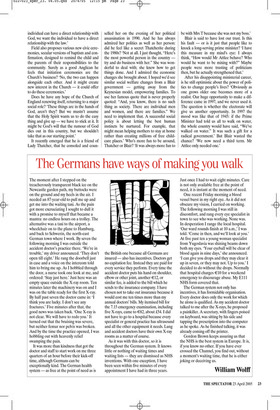The Germans have ways of making you walk
The moment after I stepped on the treacherously transparent black ice on the Newcastle garden path, my buttocks were on the ground and my heels in the air. I needed an 87-year-old to pull me up and get me into the waiting taxi. As the pain got more excruciating I sought to dull it with a promise to myself that became a mantra: no endless hours on a trolley. The alternative was a taxi to the airport, a wheelchair on to the plane to Hamburg, and back to Schwerin, the north-east German town where I work. By seven the following morning I was outside the accident doctor’s practice there. ‘We’re in trouble,’ my driver announced. ‘They don’t open till eight.’ He rang the doorbell just in case and a voice on the intercom told him to bring me up. As I hobbled through the door, a nurse took one look at me, and ordered: ‘Stay just here.’ Just here was an empty space outside the X-ray room. Ten minutes later the machinery was on and I was on the table ready for the first X-ray. By half past seven the doctor came in: ‘I think you are lucky. I don’t see any fractures.’ Five minutes after that, the good news was taken back. ‘One X-ray is not clear. We will have to redo you.’ It turned out that the bruising was severe, but neither femur nor pelvis was broken. And by the time the practice opened, I was hobbling out with heavenly relief swamping the pain.
It was more than kindness that got the doctor and staff to start work on me three quarters of an hour before their kick-off time, although Germans can be exceptionally kind. The German health system — as free at the point of need as is the British one because all Germans are insured — also has incentives. Doctors get no capitation fee. Instead they are paid for every service they perform. Every time the accident doctor puts his hand on shoulder, elbow or other joint, another €12, or similar fee, is added to the bill which he sends to the insurance company. I have chosen not to take out insurance because it would cost me ten times more than my annual doctors’ bills. My itemised bill for the 7.15 emergency examination, including five X-rays, came to €82, about £54. I did not have to go to a hospital because every specialist or general practice has ultrasound and all the other equipment it needs. Lung and accident doctors have their own X-ray rooms as a matter of course.
As it was with this doctor, so it is throughout the German system. It knows little or nothing of waiting times and waiting lists — they are dismissed as NHS inventions. With one exception, I have been seen within five minutes of every appointment I have had in three years. Just once I had to wait eight minutes. Care is not only available free at the point of need, it is instant at the moment of need.
One recent Friday morning a blood vessel burst in my right eye. As it did not obscure my vision, I carried on working. The following morning I was still in discomfort, and rang every eye specialist in town to see who was working. None was. In desperation I range the local hospital. ‘Our ward rounds finish at 10 a.m.,’ I was told. ‘Come in then, and we’ll look at you.’ At five past ten a young woman specialist from Yugoslavia was shining beams down both my eyes. ‘Your eyeball will be clear of blood again in nine days,’ she announced. ‘I can give you drops and they may clear it up in seven, or they may not. Up to you.’ I decided to do without the drops. Normally that hospital charges €10 for a weekend emergency to discourage abuse. My E111 NHS form covered that.
The German system not only has incentives, it has formidable organisation. Every doctor does only the work for which he alone is qualified. As my accident doctor talked to me after the X-rays, he proposed a painkiller. A secretary, with fingers poised on keyboard, was sitting by his side and tapping the prescription into the computer as he spoke. As he finished talking, it was already coming off the printer.
Gordon Brown keeps assuring us that the NHS is the best system in Europe. It is, if you know no other. If you have ever crossed the Channel, you find out, without a moment’s waiting time, that he is either joking or deceiving us.



















































 Previous page
Previous page